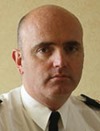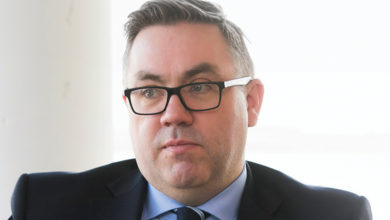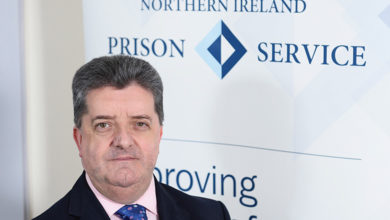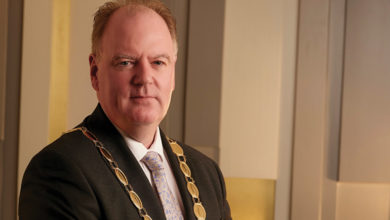All change in PSNI leadership
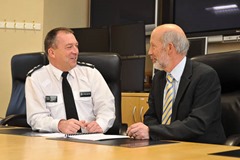 agendaNi reviews Matt Baggott’s time as Chief Constable and considers the in-tray for his successor.
agendaNi reviews Matt Baggott’s time as Chief Constable and considers the in-tray for his successor.
The role of Chief Constable of Northern Ireland can be seen as an almost unenviable task but also a career high point if the incumbent can handle it well. Sectarian division, the paramilitary threat, an international border and intense political scrutiny are added to the daily problems of crime and disorder experienced by every police force.
With its two senior officers stepping down, 2014 will be a year of transition for the PSNI. Matt Baggott’s community policing expertise was complemented by Judith Gillespie’s long experience in the RUC and strong local knowledge. Gillespie, an officer for 31 years, is highly respected in the force and stayed on for an extra three years after being offered retirement in 2011.
She retires from the PSNI on 31 March and Matt Baggott will stand down by September, when his term of office officially ends.
The Chief Constable is appointed by the Policing Board and their decision is then formally approved by the Minister of Justice. He is also accountable to the Secretary of State for the PSNI’s national security policing.
Matt Baggott was unanimously endorsed in 2009 due to his strong support for community policing and his ability to work within a tight budget. During his time in post, he has released 600 extra officers for front-line duty and secured
£250 million for counter-terrorism. Crime has decreased although violent crime has stayed at the same level.
Baggott served in the Met for 20 years and was then Assistant Chief Constable in the West Midlands (1998-2001), Deputy Chief Constable for the same constabulary (2001-2002) and Chief Constable of Leicestershire (2002-2009).
The PSNI has maintained order over the last year at a considerable cost to its officers and their families. One in ten PSNI officers have been injured – 700 out of 6,800 – and the arrival of riot police from Britain was needed to bolster an increasingly exhausted force. Fifty-six injuries were sustained in one night alone when a loyalist riot coincided with the close of the World Police and Fire Games.
Many officers have felt constrained by the emphasis that their procedures place on human rights. Baggott claimed that a heavier response would provoke even more violence and evidence about suspects was continuously gathered. This has, in turn, resulted in hundreds of arrests.
Nationalists and moderate unionists have called for a tougher line against loyalist paramilitaries, as was taken by his predecessor Hugh Orde. The Police Federation agrees and has demanded 1,000 extra officers; 378 will be recruited over the next two years. Despite their differences, Federation Chair Terry Spence praised Baggott as “a chief officer of the utmost integrity who has displayed loyalty to his colleagues in the most challenging policing environment in the western world.”
Interviews for the post are undertaken by the board’s Chair, Vice-Chair, political party lead members and an independent member. As with any other PSNI officer, the Chief Constable must be a citizen of the European Economic Area or have indefinite leave to enter or remain in the UK.
The most contentious point so far has been whether two years’ experience as an Assistant Chief Constable outside Northern Ireland should be “essential” or “desirable”.
Although David Ford was strongly criticised for his decision, the Policing Board had asked him last May to consider the issue. It has now decided to keep the status quo. This effectively rules out assistant chief constables Finlay, Kerr, Harris and Mark Hamilton.
Assistant Chief Constable George Hamilton was the internal favourite for the role last time round. Garda Deputy Commissioner Noirin O’Sullivan has also been mentioned as a possibility, although she would not be the first southerner to lead a northern force. Hugh Annesley, the RUC Chief Constable from 1989-1996, was born in Dublin.
ACC for district policing in the rural area. Joined RUC in 1985 and was District Commander for South and East Belfast before his appointment as ACC in Strathclyde (2009). Returned to Northern Ireland in 2011. BA degree in politics and economics and MBA.
Deputy Commissioner for operations in An Garda Síochána. Joined in 1981 and took up current position in 2011. Previously Assistant Commissioner for crime and security from 2009 and has led the National Drugs Unit. BA in police management and MBA.
ACC for operational support, including roads policing, public order, armed response and close protection. Born in Scotland and served for 24 years in Strathclyde Police. Joined PSNI as Assistant Chief Constable in August 2006 to focus on historical inquiries cases.
ACC for district policing in the urban area: Greater Belfast and most of County Down. Twenty years’ experience and promoted in 2009. Previously led the criminal justice department and police college. Higher education: BA in social science, masters in criminology and LLM in human rights law.
ACC for crime operations: the PSNI’s detective and intelligence work. Thirty years’ experience and promoted in 2006. Specialises in handling critical incidents and tackling hate crime, organised crime and corruption. Holds BA degree in politics and economics and masters in criminology.
ACC for service improvement, including policing with the community and criminal justice. Twenty years’ experience, including as District Commander in North and West Belfast. The newest Assistant Chief Constable, appointed in August 2013.






